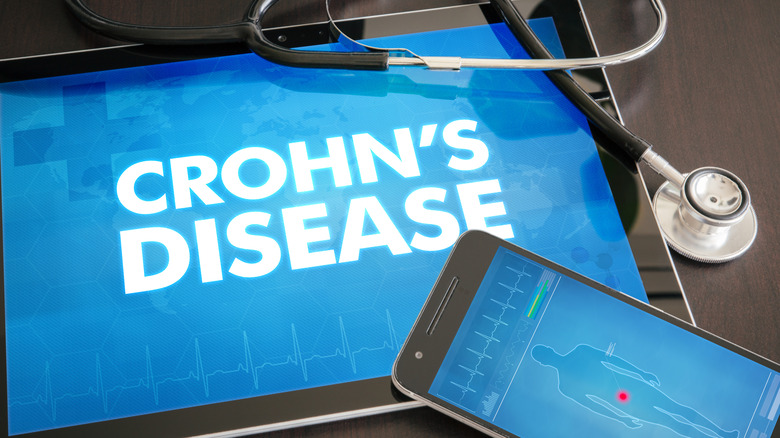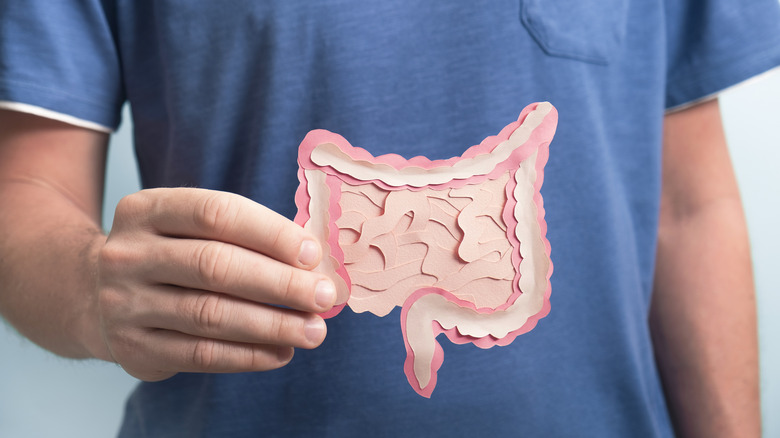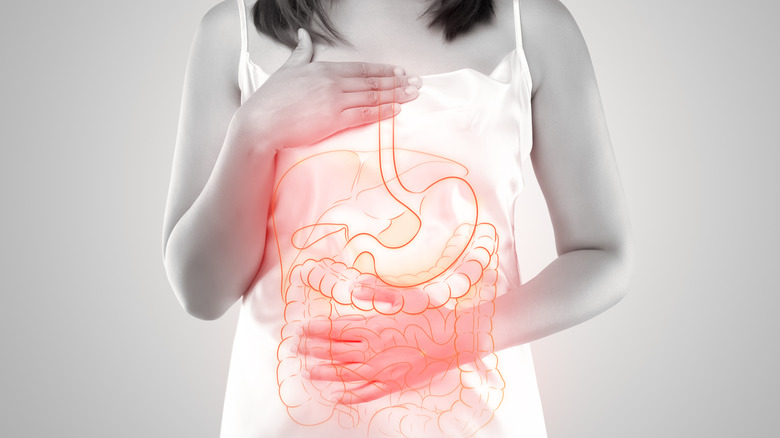Is There A Cure For Crohn's Disease?
Those who live with Crohn's disease know how debilitating it can be. If you know someone who lives with it, you might understand the pain and frustration it can cause, but is there a cure?
Crohn's disease affects the gastrointestinal (GI) tract and causes inflammation that leads to uncomfortable symptoms and complications, according to the Crohn's and Colitis Foundation. It's a chronic type of inflammatory bowel disease (IBD), meaning that there may be periods of remission and periods of flares. It was first described in 1932 by Dr. Burrill B. Crohn and his associates. Crohn's can affect all parts of the GI tract, but typically, the end of the small bowel and beginning of the colon are affected, permeating the entire depth of the intestinal wall. Crohn's is also known to "skip," meaning that some parts of the GI tract can remain untouched while others are inflamed.
Symptoms of Crohn's disease vary widely and can range from mild to severe (via the Mayo Clinic). When the disease is active, it typically causes diarrhea, abdominal pain and cramping, fatigue, fever, reduced appetite, weight loss, and blood in the stool. When severe, symptoms can include kidney stones, anemia, delayed growth in children, and inflammation of the skin, eyes, joints, liver, or bile ducts.
Who does Crohn's disease affect?
A 2013 study published in Digestive Diseases and Sciences showed that rates of Crohn's disease are increasing, affecting over half a million Americans. Crohn's typically develops in people between the ages of 20-29, according to the National Institute of Diabetes and Digestive and Kidney Diseases (NIDDK). You're more likely to develop it if you're a smoker or you have a family member who also has IBD.
Crohn's is diagnosed with a physical exam, where a doctor will check for bloating, listen to your abdomen, and tap on it to check for tenderness. It can also be diagnosed with a blood test, colonoscopy, endoscopy, or a CT scan.
While doctors aren't sure what causes Crohn's disease, they think it has some contributing factors (via NIDDK). Research shows that it may be an autoimmune response to bacteria in the GI tract, leading to inflammation. Studies show there is also a genetic link, and things like smoking and eating a high-fat diet may also contribute.
What's the outlook for those with Crohn's?
Treatment can cause Crohn's to go into remission, but there is no cure for the disease (via the Mayo Clinic). Treatment is different for everybody and works by reducing inflammation and limiting the risk of complications. Corticosteroids, like Prednisone, are typically the first step in treating Crohn's disease. Immune system suppressors also target the immune system to reduce the substances that cause inflammation. Typically, a combination of these forms of treatment works best. Other medications, like antidiarrheals and pain relievers, may help manage symptoms. Diet changes may also help, like a low-fiber diet that reduces the risk of intestinal obstruction due to a constricted bowel.
If medications aren't useful to manage symptoms, surgery may be required (via the Crohn's and Colitis Foundation). In fact, it's estimated that two-thirds to three-quarters of people with Crohn's will need surgery. Surgery can't cure Crohn's, but it helps by preserving portions of the GI tract and improves quality of life.



